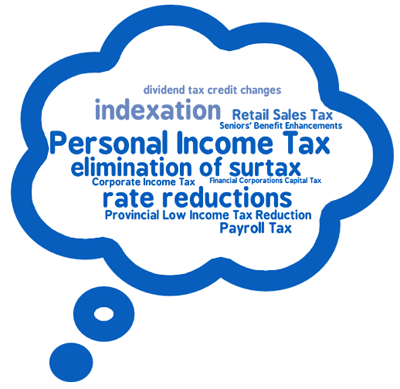Introduction
The Government of Newfoundland and Labrador has three methods to deal with the current budget shortfall: increase revenues through raising taxes and user fees; decrease expenditures; and borrowing.
Provincial Government revenues come from several sources, including offshore royalties. As of Budget 2014, offshore royalties were estimated to account for approximately 30 per cent of gross revenue. As of January 2015, this estimate dropped to 23 per cent due to the unforeseen sudden and drastic drop in global oil prices.
The Provincial Government is anticipating it will have a revenue shortfall of at least $1 billion dollars for the 2015-16 fiscal year.
Complexities of Forecasting Oil Revenues
Forecasting oil revenues is impacted by three factors: the price of oil, the exchange rate, and the production. There is significant volatility, uncertainty and risk in making short-term predictions.
“World oil prices are highly volatile and production levels related to non-renewable resources can vary significantly. Therefore, changes in these factors can result in significant changes in revenue from year to year and differences between budget forecasts and actual results. As a result, Government’s financial position can be significantly impacted by factors which are outside of its control.”
2012 Auditor General Report (page 37)
Oil Price
Oil prices are determined by a number of complex global factors which can be extremely unstable, resulting in oil prices which can change frequently and are today extremely unstable. The price of oil has decreased significantly over the past few months, dropping by more then 40 per cent since Budget 2014. It is estimated that during 2015-16, a $1 US drop in oil price would result in a reduction of $26 million in royalties.
Exchange Rate
Along with low oil prices, we have seen a corresponding decrease in the Canadian dollar in comparison to the US dollar. The dollar hit a high of just over 85 cents at the beginning of January, but dropped to just under 79 cents by the end of the month. It is estimated that during 2015-16, a one cent drop in the USD/Cdn exchange rate would result in an increase of $18 million in royalties.
Oil Production
Oil production levels are a product of the operating plans of the producing fields located in offshore Newfoundland and Labrador. Oil production peaked in 2007-08 with 134 million barrels. As of Fall 2014, this year’s production is expected to be 79 million barrels. While oil prices are at a four-year low, we should also consider that this year the province’s oil production is projected to be near its lowest level in 13 years. Our oil production is currently 58 per cent of the 2007 peak.
Maintaining A Fair and Competitive Provincial Tax System
Since 2004, the Provincial Government has allowed for more money to go into the pockets of Newfoundlanders and Labradorians to help reduce costs for every household in our province. For the 2014 taxation year, it is expected that taxpayers will pay approximately $744 million less than they would have paid in 2004, as a result of some of the following reductions:

- Personal Income Tax
- Including rate reductions, elimination of surtax, indexation, Low Income Tax Reduction enhancement, dividend tax credit changes, new non-refundable credits
- Seniors’ Benefit Enhancements
- Retail Sales Tax
- Elimination of RST on insurance
- Rate reduction for used vehicles
- Residential Energy Rebate – effectively eliminated provincial sales tax on heating
- Corporate Income Tax
- Small business rate reduction
- Small business income threshold increased
- Financial Corporations Capital Tax
- Harmonized with federal capital tax
- Payroll Tax
- Increase in exemption threshold
The Provincial Low Income Tax Reduction eliminates (or reduces) tax for low income individuals and families:
- Individuals with income less than $18,547 do not pay provincial income tax
- Families and single parents with income less than $31,362 do not pay provincial income tax
Our personal income tax system is fair, progressive and competitive. People with low or modest incomes pay less tax, and people with high incomes pay more. For example, 6.5 per cent of individuals who file income tax returns pay 38 per cent of income tax collected. About 35 per cent of those who file income tax pay nothing, because our system protects individuals with low or modest incomes.
